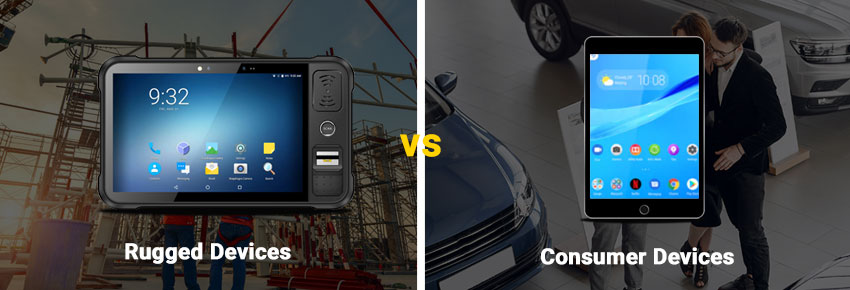Rugged vs Consumer Devices: Making the Tough Choice
Nov 05, 2020 | 42Gears Team

In the age of super specialization, anything that merely does the job is just a make-shift arrangement. This means that today, people have come to expect specially designed equipment or solutions to help them do specific tasks. If a solution doesn’t exactly align with their use cases, users will not be satisfied. The same goes for mobile devices, too. Thus, businesses are especially careful when choosing the kinds of devices they want to onboard and deploy. And as such, organizations that require people to work in harsh environments, such as logistics, construction, or warehousing companies, choose rugged over consumer-grade devices to enable their employees.
Difference Between Rugged Devices and Consumer-Grade Devices
Both rugged and consumer-grade devices are computing devices, such as smartphones, desktops, or tablets, that employees use to complete their job assignments. However, while any off-the-shelf computing device qualifies as a consumer-grade device, rugged devices are those that are specifically designed to function smoothly even in harsh and extreme environments.
Benefits of Choosing Rugged Over Consumer Devices
Enterprise mobility is fast gaining traction, especially in the pandemic-hit world. But with so many options available in the market, each boasting its own set of features, choosing the right kind of device isn’t easy. Let’s take a look at why rugged devices fit the bill in most cases.
- Total Cost of Ownership – Although the upfront cost of procuring rugged devices is high, the overall cost of maintaining and managing them over three to five years is considerably less as compared to that of consumer-grade devices.
- Battery – Rugged device batteries last longer than those of consumer devices. As a matter of fact, a rugged device can last an entire shift on a single charge. Besides, rugged device batteries are easily replaceable.
- Production Cycle – Consumer-grade devices get phased out quickly. Rugged devices, on the other hand, don’t. So, IT teams can support rugged devices for years. In addition, vendors such as Zebra offer security solutions to extend the life cycle of their enterprise devices.
- Performance – Rugged devices can handle the demands of tough environments, extreme temperatures, and more without malfunctioning. In short, rugged devices are more robust and hard-wearing than their consumer-grade counterparts.
- Accessories – Most often, rugged devices boast a range of accessories, such as charging docks, holsters, etc., that help maximize the benefits they provide.
- Purpose-Built – Rugged devices usually allow for more customization. Thus, IT teams can configure rugged devices to suit specific business needs. Rugged handhelds also support a wider range of hardware than consumer-grade devices do.
- Long Term Support – Typically, rugged devices come with cost-effective service contracts that include unique clauses to cover both manufacturing defects and damages due to user abuse.
Conclusion
As is evident, businesses have good reason to choose rugged over consumer-grade devices. In addition to the benefits listed above, rugged devices are also easy to manage using solutions like SureMDM by 42Gears. 42Gears’ rugged device management solution not only makes it possible for businesses to quickly enroll, configure, and deploy rugged handhelds in bulk, but also enables them to manage their complete life cycles until device decommissioning.
Fast Enrollment, Tough Security & Scalable
Management of Rugged Devices
Subscribe for our free newsletter
